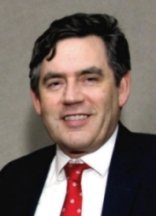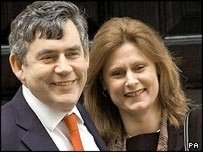
|
Prime Minister Gordon Brown
Prime Minister Gordon Brown was born Gordon James Brown in Glasgow 20 February 1951 and his political journey and career have led him to become the Prime Minister of the United Kingdom. This means he is also First Lord of the Treasury and Minister for the Civil Service. Of course he is also the current Member of Parliament for Kirkcaldy and Cowdenbeath and he bacame the Leader of the Labour Party in 2007.
Prime Minister Gordon Brown began his climb up the political ladder when he became the Chancellor of the Exchequer from 2 May 1997. He remained in that role until 27 June 2007, making him Britain's longest serving Chancellor since Nicholas Vansittart (1812–1823). However, when he was young, His father, Rev. John Ebenezer Brown, was a Church of Scotland Minister and the family moved to
Kirkcaldy
when Gordon was a lad. Gordon was educated firstly at Kirkcaldy West Primary School, and then, between 1961 and 1967, at Kirkcaldy High School. He did well at school and was accepted by the University of Edinburgh to study history at the age of 16, making Prime Minister Gordon Brown to be one of only four university-educated Prime Ministers who did not attend Oxford or Cambridge. Gordon graduated from Edinburgh with First Class Honours M.A. in 1972, and stayed on to complete his Ph.D. (which he gained in 1982), titled “The Labour Party and Political Change in Scotland 1918-29”. His political passion was emerging. While still a student, the future Prime Minister Gordon Brown was elected Rector of the University of Edinburgh and Chairman of the University Court in 1972. He served as Rector until 1975, and he also edited “The Red Paper on Scotland”. He worked as a temporary lecturer at Edinburgh, before lecturing in Politics at Glasgow College of Technology from 1976 to 1980. He went on to work as a journalist at Scottish Television, later serving as current affairs editor until his election to parliament in 1983. In the 1979 general election, Gordon Brown stood for the Edinburgh South constituency, but lost to the Conservative candidate. It was on his 2nd attempt when he stood for Dunfermline East as a Labour MP that he was elected for Parliament in 1983 In 1986, he published a biography of the Independent Labour Party politician James Maxton, the subject of his Ph.D. thesis. Brown was Shadow Chief Secretary to the Treasury from 1987 to 1989 and then Shadow Secretary of State for Trade and Industry, before becoming Shadow Chancellor in 1992. After the sudden death of John Smith in May 1994, Gordon was one of those tipped as a potential party leader, but as Shadow Chancellor, he worked hard to show himself capable and competent and publicly committed Labour to following the Conservatives' spending plans for the first two years after taking power.
But Prime Minister Gordon Brown is not just a politician, he is a also a FAMILY man. Gordon married his wife Sarah at his home in North Queensferry, Fife, in the year 2000 after a four-year courtship. Their first child, a daughter, Jennifer Jane, was born prematurely on 28th December 2001, but tragically died on 8th January 2002.
Their second child, John, was born on 17th October 2003, and their third child, a son, James Fraser, was born on 17th July 2006. Sadly for the Brown family, James was diagnosed with cystic fibrosis.
Gordon’s long period as Chancellor of the Exchequer has set several records. He is the longest-serving Labour Chancellor of the Exchequer, and has stated that his Chancellorship has seen the longest period of sustained economic growth in UK history, although part of this growth period started under the preceding Conservative government in 1993, and the details in Brown's growth figures have been challenged. When he became Chancellor, Gordon gave the Bank of England operational independence in monetary policy and responsibility for setting interest rates. The Conservatives opposed this until 1999, as a prelude to the abolishment of sterling and entrance into the euro zone, while Bank of England independence had been a key platform of Liberal Democrat economic policy since the 1992 general election. Gordon Brown resigned as Chancellor to become Prime Minister Gordon Brown, taking over the Leadership of the United Kingdom on 27 June 2007. Like almost all previous Prime Ministers, Brown concurrently serves as the First Lord of the Treasury and the Minister for the Civil Service, is a member of the Cabinet of the United Kingdom and, hence, also a Privy Counsellor. He is also Leader of the Labour Party and Member of Parliament for the constituency of Kirkcaldy and Cowdenbeath. Brown has been careful not to suggest that there will be any U-turns in the key areas of Blair's social policy, or any radical breakaway from New Labour. He has, however, proposed a different style of government than that of Blair's much-criticised 'presidential-style' government. It would seem that Prime Minister Gordon Brown remains committed to the Iraq War, but he said in his speech just before taking office that he would "learn the lessons" from the mistakes made in Iraq. He still supports American policies, but has said that he wants a more "solid but not slavish" relationship with Washington. Gordon and his wife Sarah and family spend their time in their Fife home when not in Downing Street, London.
|
Available from Scotlands Enchanting Kindom
|
Advertise with us!
Translate this page
|
Site search Web search |




